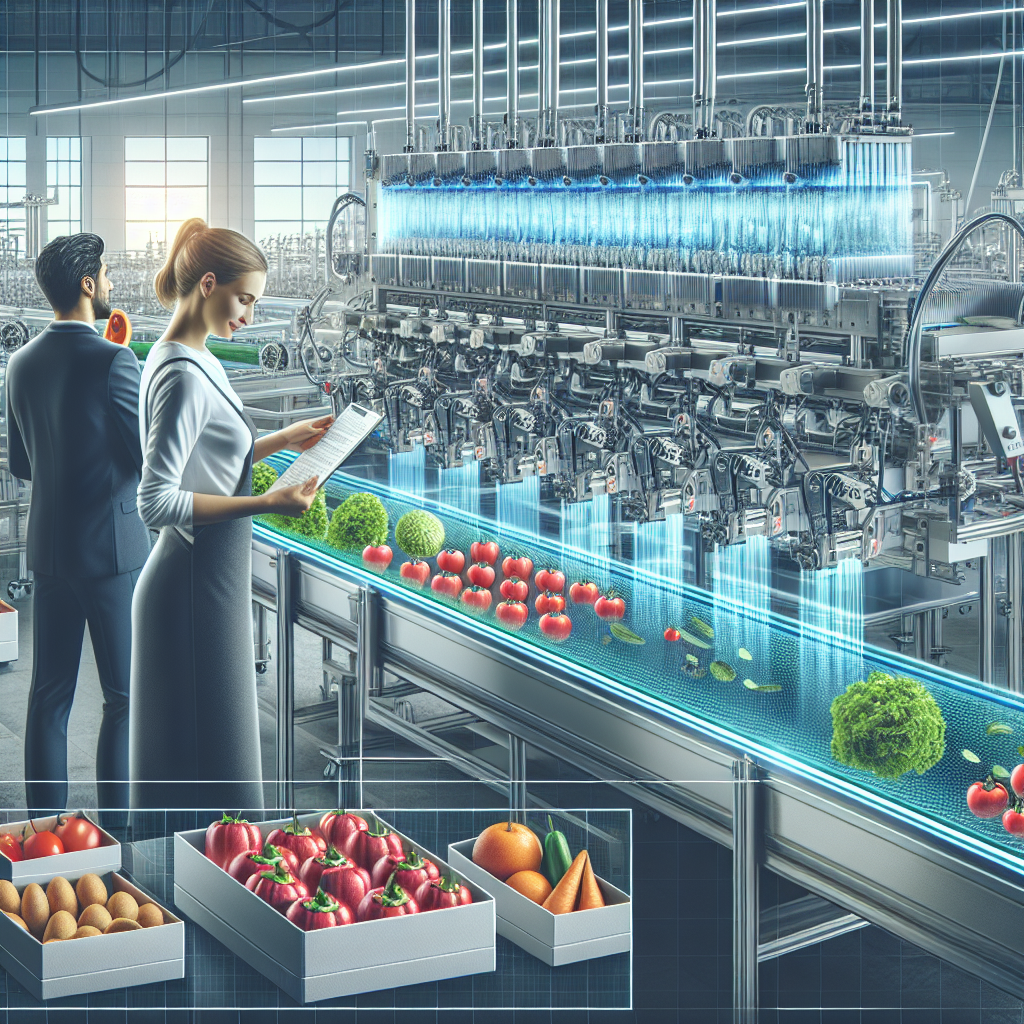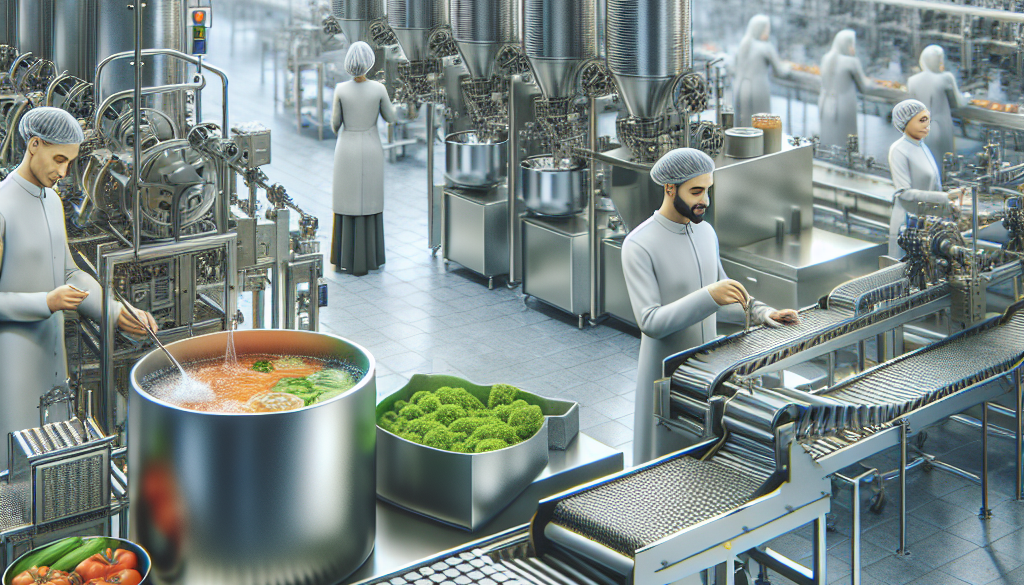Automating food processing for the benefit of processors
-
Table of Contents
- Automating Food Processing: Boosting Efficiency for Processors
- The Rise of Automation in Food Processing
- Key Benefits of Automation for Food Processors
- Statistics Supporting the Shift to Automation
- Implementing Automation: Strategies for Success
- Case Studies: Automation in Action
- Challenges and Considerations
- Conclusion: Embracing the Future of Food Processing
- ETprotein: Your Partner in Food Processing Excellence
Automating Food Processing: Boosting Efficiency for Processors

The food processing industry is a cornerstone of the global economy, providing essential products to billions of consumers daily. As the demand for food continues to rise, processors are turning to automation to enhance efficiency, reduce costs, and improve product quality. This article delves into the benefits of automating food processing and how it revolutionizes the industry for processors.
The Rise of Automation in Food Processing
Automation in food processing isn’t a new concept, but its adoption has accelerated in recent years. Technological advancements have made automation more accessible and cost-effective, allowing even small to medium-sized processors to integrate sophisticated systems into their operations.
Key Benefits of Automation for Food Processors
- Increased Efficiency: Automated systems can operate continuously without fatigue, leading to higher throughput and faster processing times.
- Consistency and Quality Control: Machines can perform tasks with precision, ensuring consistent product quality and reducing the risk of human error.
- Cost Reduction: Although the initial investment may be significant, automation can lead to long-term savings by reducing labor costs and minimizing waste.
- Enhanced Safety: Automation reduces the need for human workers to perform dangerous tasks, thereby decreasing the risk of workplace injuries.
- Scalability: Automated systems can be scaled up or down to meet changing production demands without the complexities of managing a large workforce.
Statistics Supporting the Shift to Automation
Recent studies and market analyses provide compelling evidence for the shift towards automation in food processing. According to a report by Meticulous Research, the food automation industry is expected to grow at a CAGR of 9.5% from 2020 to 2027. Another study by the Association for Packaging and Processing Technologies (PMMI) indicates that 94% of food manufacturers are using or considering automation technology to improve their operations.
Implementing Automation: Strategies for Success
For food processors looking to automate, a strategic approach is essential. Here are some key strategies for successful implementation:
- Assessing Needs: Processors should evaluate their operations to identify areas where automation can have the most significant impact.
- Choosing the Right Technology: There are various automation technologies available, and selecting the right one depends on the specific needs of the processor.
- Partnering with Experts: Working with experienced automation vendors can help ensure a smooth transition and provide ongoing support.
- Training Staff: While automation may reduce the need for manual labor, it’s crucial to train staff to operate and maintain new systems effectively.
- Continuous Improvement: Automation is not a one-time investment. Processors should continually assess and upgrade their systems to stay competitive.
Case Studies: Automation in Action
Real-world examples illustrate the transformative power of automation in food processing. For instance, a meat processing plant that implemented robotic butchering saw a 50% increase in production speed. Similarly, a bakery that introduced automated packaging systems reduced labor costs by 40% while improving packaging consistency.
Challenges and Considerations
Despite the benefits, processors must navigate several challenges when automating their operations:
- High Initial Investment: The cost of automation technology can be a barrier for some processors, particularly small businesses.
- Integration with Existing Systems: Integrating new automation solutions with legacy equipment can be complex and require specialized expertise.
- Workforce Impact: Automation can lead to workforce reductions, which must be managed sensitively and ethically.
- Regulatory Compliance: Food processors must ensure that automated systems comply with food safety and quality regulations.
Conclusion: Embracing the Future of Food Processing
Automation presents a clear path forward for food processors seeking to enhance efficiency, improve product quality, and remain competitive in a rapidly evolving industry. By embracing automation, processors can meet the growing global demand for food products while addressing the challenges of labor shortages, safety concerns, and the need for sustainable practices.
ETprotein: Your Partner in Food Processing Excellence
For food processors looking to incorporate high-quality protein products into their offerings, ETprotein stands as a reliable partner. Their extensive range of organic bulk vegan proteins and L-(+)-Ergothioneine (EGT) products are ideal for processors aiming to meet the demands of health-conscious consumers. With non-GMO, allergen-free attributes, and high purity levels, ETprotein’s products can seamlessly integrate into automated food processing systems, ensuring that processors deliver only the best to their customers.
About ETprotein:
ETprotein, a reputable protein and L-(+)-Ergothioneine (EGT) Chinese factory manufacturer and supplier, is renowned for producing, stocking, exporting, and delivering the highest quality organic bulk vegan proteins and L-(+)-Ergothioneine. They include Organic rice protein, clear rice protein, pea protein, clear pea protein, watermelon seed protein, pumpkin seed protein, sunflower seed protein, mung bean protein, peanut protein, and L-(+)-Ergothioneine EGT Pharmaceutical grade, L-(+)-Ergothioneine EGT food grade, L-(+)-Ergothioneine EGT cosmetic grade, L-(+)-Ergothioneine EGT reference grade and L-(+)-Ergothioneine EGT standard. Their offerings, characterized by a neutral taste, non-GMO, allergen-free attributes, with L-(+)-Ergothioneine purity over 98%, 99%, cater to a diverse range of industries. They serve nutraceutical, pharmaceutical, cosmeceutical, veterinary, as well as food and beverage finished product distributors, traders, and manufacturers across Europe, USA, Canada, Australia, Thailand, Japan, Korea, Brazil, and Chile, among others.
ETprotein specialization includes exporting and delivering tailor-made protein powder and finished nutritional supplements. Their extensive product range covers sectors like Food and Beverage, Sports Nutrition, Weight Management, Dietary Supplements, Health and Wellness Products, and Infant Formula, ensuring comprehensive solutions to meet all your protein needs.
As a trusted company by leading global food and beverage brands and Fortune 500 companies, ETprotein reinforces China’s reputation in the global arena. For more information or to sample their products, please contact them and email sales(at)ETprotein.com today.












